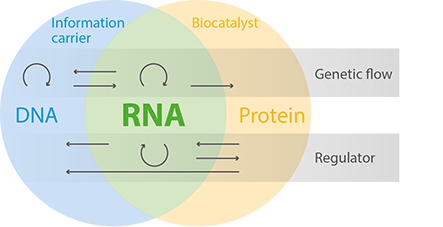RNA as the central molecule of life
The last decades of research in molecular biology provided evidence that RNA (ribonucleic acid) is not a simple messenger between DNA (deoxyribonucleic acid) and proteins, but plays a central role in cellular processes. Growing consensus suggests that life originated as an ‘RNA world’ where RNA served as both, a carrier of genetic information and a biocatalyst. Fundamental processes such as for example the synthesis of proteins are catalyzed by RNA molecules in all existing organisms. In recent years, a tremendous number of non-coding (nc)RNAs and complex RNA-mediated pathways involved in gene regulation have been discovered. These findings underline the pivotal contribution of RNA to the overall regulation of eukaryotic gene expression.
Within a cell, various types of RNA molecules exert complex and multifaceted functions, involved in numerous cellular processes. It is therefore not surprising, that many diseases emerge from aberrant RNA processing or RNA-dependent dysreguation of gene expression. Many genetic disorders derive from mutations in non-coding genome regions and in RNA-binding proteins. In various cancers and metabolic diseases, changes in the level of ncRNAs and RNA-binding proteins can be observed. Remarkably, major diseases causing human death, including cardiac failure, cancer, neurodegeneration and metabolic diseases, are associated with malfunctioning RNA regulation. Many additional diseases are expected to be caused by yet unknown defects in RNA-based gene regulation. Understanding the molecular basis of RNA regulation is therefore essential to lead to better diagnostic tools, to the identification of new therapeutic targets as well as to new drugs. RNA is not only a therapeutic target, but can also itself serve as a drug. The discovery of small regulatory RNAs promoted research towards the application of small RNA molecules as highly specific therapeutics. A few RNA based drugs, e.g. for the treatment of homozygous familial hypercholesterolemia or neovascular age-related macular degeneration, are already on the market.
Goals of the NCCR RNA & Disease:
- Establishing a Swiss RNA research focus that consolidates and reinforces the position of Switzerland in RNA biology by a coordinated, interdisciplinary research program
- Building bridges between basic and medical research to promote rapid transition of new findings into medical applications
- Advancing our understanding of RNA processing and surveillance mechanisms involved in global regulation of mRNAs and ncRNAs
- Identification of disease mechanisms resulting from aberrant RNA function
- Development of possible therapeutic and diagnostic approaches
